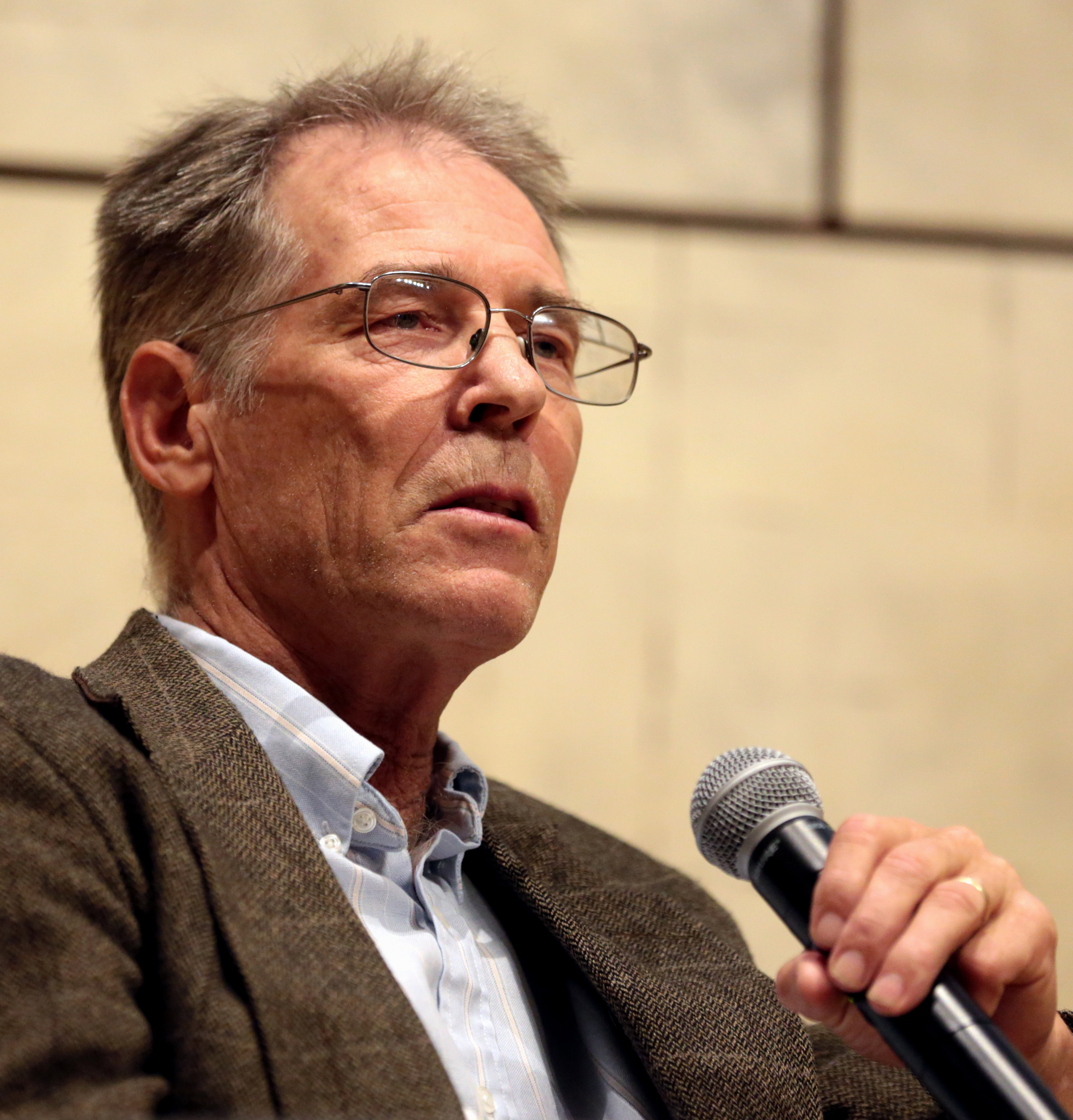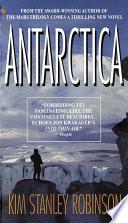Works
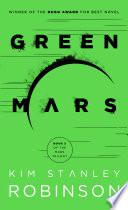
Green Mars
Kim Stanley Robinson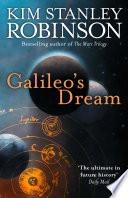
Galileo's Dream
Kim Stanley Robinson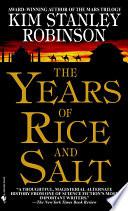
The Years of Rice and Salt
Kim Stanley RobinsonFamous Kim Stanley Robinson Quotes
Kim Stanley Robinson Quotes about people
“Historical analogy is the last refuge of people who can't grasp the current situation.”
Frank Chalmers
Red Mars (1992)
Source: Galileo's Dream (2009), Ch. 20, p. 513–514
As quoted in "Future tense" in The Guardian (14 September 2005) http://www.guardian.co.uk/books/2005/sep/14/sciencefictionfantasyandhorror.sarahcrown
Book 4: "The Alchemist", § 11
The Years of Rice and Salt (2002)
Interview http://www.locusmag.com/1997/Issues/09/KSRobinson.html in Locus, (September 1997)
Context: Science fiction rarely is about scientists doing real science, in its slowness, its vagueness, the sort of tedious quality of getting out there and digging amongst rocks and then trying to convince people that what you're seeing justifies the conclusions you're making. The whole process of science is wildly under-represented in science fiction because it's not easy to write about. There are many facets of science that are almost exactly opposite of dramatic narrative. It's slow, tedious, inconclusive, it's hard to tell good guys from bad guys — it's everything that a normal hour of Star Trek is not.
“The only part of an argument that really matters is what we think of the people arguing.”
John Boone
Red Mars (1992)
Context: The only part of an argument that really matters is what we think of the people arguing. X claims a, Y claims b. They make arguments to support their claims with any number of points. But when their listeners remember the discussion, what matters is simply that X believes a and Y believes b. People then form their judgment on what they think of X and Y.
Kim Stanley Robinson Quotes about the world
As quoted in John Clute, "Scores" http://www.strangehorizons.com/2010/20100118/clute-c.shtml, in Strange Horizons (18 January 2010)
Galileo's Dream (2009)
“A sudden gust: How big the world seems in a wind.”
Book 1: "Awake to Emptiness", Ch. 1
The Years of Rice and Salt (2002)
As quoted in "Future tense" in The Guardian (14 September 2005)
Book 9: "Nsara", § 5
The Years of Rice and Salt (2002)
Source: Blue Mars (1996), Chapter 8, “The Green and the White” (p. 393)
Source: Green Mars (1993), Chapter 7, “What Is to Be Done?” (p. 391)
Kim Stanley Robinson: Trending quotes
Interview http://www.locusmag.com/1997/Issues/09/KSRobinson.html in Locus, (September 1997)
Context: Science fiction rarely is about scientists doing real science, in its slowness, its vagueness, the sort of tedious quality of getting out there and digging amongst rocks and then trying to convince people that what you're seeing justifies the conclusions you're making. The whole process of science is wildly under-represented in science fiction because it's not easy to write about. There are many facets of science that are almost exactly opposite of dramatic narrative. It's slow, tedious, inconclusive, it's hard to tell good guys from bad guys — it's everything that a normal hour of Star Trek is not.
Coyote ("What Is to Be Done?", p. 370)
Green Mars (1993)
Context: Even if you want no state, or a minimal state, then you have to argue point by point. Especially since the minimalists want to keep the economic and police system that keeps them privileged. That's libertarians for you — anarchists who want police protection from their slaves. No! If you want to make the minimum-state case, you have to argue it from the ground up.
Source: Galileo's Dream (2009), Ch. 14, p. 329
Kim Stanley Robinson Quotes
Source: Galileo's Dream (2009), Ch. 13, p. 280
Context: We all have seven secret lives. The life of excretion; the world of inappropriate sexual fantasies; our real hopes; our terror of death; our experience of shame; the world of pain; and our dreams. No one ever knows these lives. Consciousness is solitary. Each person lives in that bubble universe that rests under the skull, alone.
“People then form their judgment on what they think of X and Y.”
John Boone
Red Mars (1992)
Context: The only part of an argument that really matters is what we think of the people arguing. X claims a, Y claims b. They make arguments to support their claims with any number of points. But when their listeners remember the discussion, what matters is simply that X believes a and Y believes b. People then form their judgment on what they think of X and Y.
“Rock is much more malleable than ideas.”
Book 6: "Widow Kang", Ch. 3
The Years of Rice and Salt (2002)
Book 1: "Awake to Emptiness", Ch. 2
The Years of Rice and Salt (2002)
“One of the chief features of incompetence was an inability to see it in oneself.”
Source: Galileo's Dream (2009), Ch. 13, p. 295
Book 1: "Awake to Emptiness", Ch. 2
The Years of Rice and Salt (2002)
“Science is--or should be--the greenest force of all.”
As quoted in "Heroes of the Environment 2008" http://content.time.com/time/specials/packages/article/0,28804,1841778_1841779_1841803,00.html in Time (24 September 2008)
Source: Galileo's Dream (2009), Ch. 13, p. 284
thoughts of Frank Chalmers
Red Mars (1992)
“It was not power that corrupted people, but fools who corrupted power.”
Nadia Chernyshevski
Green Mars (1993)
Source: Galileo's Dream (2009), Ch. 15, p. 354; note: though this statement is incorporated into the story as one Galileo spoke, it is actually a quotation of one he historically made in his Dialogue Concerning The Two Chief World Systems http://www4.ncsu.edu/~kimler/hi322/Dialogue-extracts.html as translated by Stillman Drake.
Source: Galileo's Dream (2009), Ch. 13, p. 282
Book 2: "The Haj in the Heart", Ch. 5
The Years of Rice and Salt (2002)
“The sky itself is the eighth color of the rainbow, spread over the whole sky for us, all the time.”
Source: Galileo's Dream (2009), Ch. 15, p. 354
For anyone who had experienced just once the understanding of one single thing, thus truly tasting how knowledge is accomplished, would then recognize that of the infinity of other truths, he understands nothing.
Source: Galileo's Dream (2009), Ch. 15, p. 354; note: though this statement is incorporated into the story as one Galileo spoke, it is actually a quotation of one he historically made in his Dialogue Concerning The Two Chief World Systems http://www4.ncsu.edu/~kimler/hi322/Dialogue-extracts.html as translated by Stillman Drake.
Book 3: "Ocean Continents"
The Years of Rice and Salt (2002)
Source: Blue Mars (1996), Chapter 14, “Phoenix Lake” (p. 750)
Source: Blue Mars (1996), Chapter 14, “Phoenix Lake” (p. 748)
Source: Blue Mars (1996), Chapter 14, “Phoenix Lake” (pp. 746-747)
“We’ve moved beyond our ability to understand our technology.”
Source: Blue Mars (1996), Chapter 13, “Experimental Procedures” (p. 692)
they weren’t always
Source: Blue Mars (1996), Chapter 13, “Experimental Procedures” (p. 657)
“No—living on after the memory died was mere farce, pointless and awful.”
Source: Blue Mars (1996), Chapter 13, “Experimental Procedures” (p. 644)
Source: Blue Mars (1996), Chapter 12, “It Goes So Fast” (p. 621)
“Ah, never fear; death could be trusted to show up. No doubt well before she wanted it.”
Source: Blue Mars (1996), Chapter 12, “It Goes So Fast” (p. 603)
“Immigration worked as a time machine, bringing up little islands of the past into the present.”
Source: Blue Mars (1996), Chapter 12, “It Goes So Fast” (p. 598)
Source: Blue Mars (1996), Chapter 12, “It Goes So Fast” (p. 566)
Source: Blue Mars (1996), Chapter 12, “It Goes So Fast” (p. 563)
Source: Blue Mars (1996), Chapter 11, “Viriditas” (p. 483)
“It’s amazing what superstitions survive in fearful minds.”
Source: Blue Mars (1996), Chapter 10, “Werteswandel” (p. 462)
Source: Blue Mars (1996), Chapter 9, “Natural History” (p. 433)
“A change in the form of government, why should that make a difference in the way he lived?”
Source: Blue Mars (1996), Chapter 8, “The Green and the White” (p. 381)
“Could politics ever be anything but politics, practical, cynical, compromised, ugly?”
Source: Blue Mars (1996), Chapter 8, “The Green and the White” (p. 363)
“Tourism is an ugly business, it’s not fit work for human beings. It’s hosting parasites.”
Source: Blue Mars (1996), Chapter 5, “Home At Last” (p. 239)
“Power is like matter, it has gravity, it clumps and then starts to draw more into itself.”
Source: Blue Mars (1996), Chapter 4, “Green Earth” (p. 166)
Source: Blue Mars (1996), Chapter 3, “A New Constitution” (p. 156)
Source: Blue Mars (1996), Chapter 3, “A New Constitution” (p. 156)
Source: Blue Mars (1996), Chapter 3, “A New Constitution” (pp. 128-129)
Source: Blue Mars (1996), Chapter 2, “Areophany” (p. 80)
“But one had to trust instruments over instincts, that was science.”
Source: Blue Mars (1996), Chapter 2, “Areophany” (p. 70)
“Not everyone was as good at creation as they were at complaining.”
Source: Blue Mars (1996), Chapter 2, “Areophany” (p. 64)
Source: Green Mars (1993), Chapter 10, “Phase Change” (p. 579)
“Every generation is its own secret society.”
Source: Green Mars (1993), Chapter 9, “The Spur of the Moment” (p. 480)
Source: Green Mars (1993), Chapter 9, “The Spur of the Moment” (p. 450)
Source: Green Mars (1993), Chapter 8, “Social Engineering” (p. 410)
Source: Green Mars (1993), Chapter 8, “Social Engineering” (p. 401)
“Nakedness was dangerous to the social order, she thought, because it revealed too much reality.”
Source: Green Mars (1993), Chapter 7, “What Is to Be Done?” (p. 395)
Source: Green Mars (1993), Chapter 7, “What Is to Be Done?” (p. 387)
